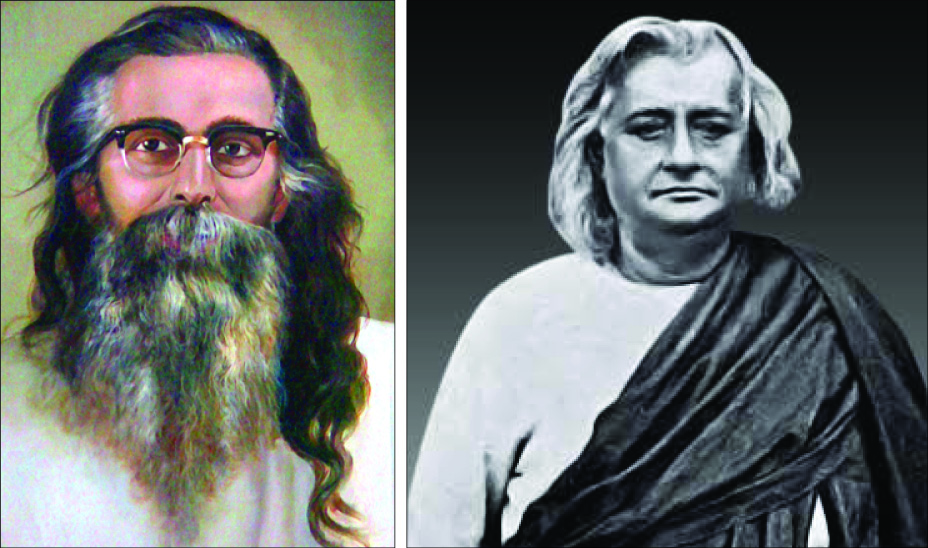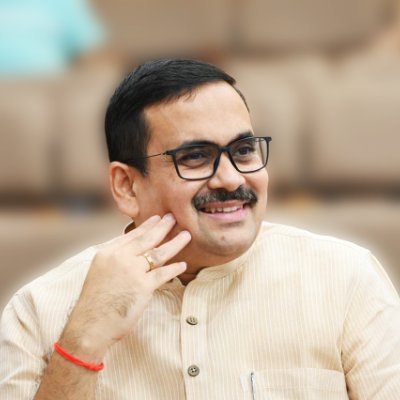Under the guidance of Swami Akhandananda at Sargachi Ashram, young Golwalkar embraced service as true worship, merged his spirituality with action, and made himself ready for transformative social contributions.
1936 was the centenary year of Sri Ramakrishna, and the young seeker, Golwalkar, was soon intensely involved in various works of the Ashram at Sargachi, and more importantly in serving his Master.
‘Gowalkar’, as Swami Akhandananda addressed him, would, in the next four months, immerse himself in his spiritual quest. Sri Ramakrishna’s centenary celebrations were to begin in February. A national committee was formed with Swami Akhandananda as its president. ‘It was planned that the inauguration of the Centenary would take place at Belur Math on the birth anniversary of Sri Ramakrishna, and would be followed by celebrations across the world, finally to be concluded at Calcutta and Belur Math in March of 1937’, writes Akhandananda’s biographer, Swami Annadananda.
The celebration of Sri Ramakrishna’s centenary would be Akhandananda’s final grand work. When asked by the legendary Josephine Macleod, herself advanced in years by then, for a message that people want for the coming centenary of Sri Ramakrishna, Akhandananda, replied, ‘I have no message of mine own, but I have got this message from the Lord, – “I am Infinite and Eternal. What is my centenary?”’
In the late Ranga Hari, one finds an extremely moving raconteur of the ‘Spiritual Seeker of Sargachi.’ Sargachi, argues Ranga Hari, ‘was not just a unidimensional centre of spirituality.’ Its founding idea was that of serving society. Its founder, ‘fired by the eagerness to serve people’, established it thus. For him, there was ‘nothing greater than service to mankind.’ The seekers, therefore, who came to the centre, observes Ranga Hari, ‘needed practical knowledge and skills to run it properly.’
Golwalkar perhaps did not know of this dimension of the Sargachi Ashram, when he eventually frequented it in search of spiritual realization. ‘I shouldn’t say this but I admit that I had gone there to think of God,’ Golwalkar recalled years later. ‘He [Swami Akhandananda] told me, “Forget about God, first clean utensils.” I cleaned the utensils with full sincerity. He then said, “Now take up dusting and cleaning.” Then he ordered, “Water the garden.” I never showed my disinterest in all these tasks. I did whatever I was asked to do. Then, he finally said, “Ok, now think of God.” Thus, Golwalkar learnt, says Ranga Hari, the ‘lesson of true karma yoga there. He had internalized it.’
Swami Akhandananda insisted on ‘work, work, but as worship’, recalls Swami Niramayananda of his days spent with the former at Sargachi. In his evening talks Akhandananda would often dilate on that path. ‘The path of karma yoga is a very difficult path,’ he would say. Meditation and japa were comparatively much easier… ‘work, work, towards something positive, work, work, but as worship, this is yoga. If your meditation and japa is done well, then your strength of working and of skill in work will increase, you will never tire, because your energy is not wasted, you will never get irritated because you are not attached to anything, therefore work calmly always, work tirelessly. This is the test on whether your mind is on track.’
One evening, Niramayananda records, Akhandananda exhorted them to evoke this certitude that ‘whatever I do is sadhana. Whatever I cannot think of as sadhana, I shall not do. When I eat – I am offering Him, when I am strolling or roaming the city – I am circumambulating Him, even when I am lying down or sleeping, it must be as if I am prostrating before Him or am contemplating Him…’ This was Akhandananda’s penance of work, of service.
Golwalkar was modest when he said that he did not show disinterest in the tasks assigned to him. In fact, he performed each task to perfection. Akhandananda’s mantra of work was transformative. As Golwalkar’s biographer, Bhishikar writes, ‘Whether it was sweeping the floor or washing Swamiji’s clothes or cleaning utensils, no chore was too low for him. Even a trace of ego would have kept a person away from such menial service. Fulfilment of life is possible only through the Guru’s Grace and he too puts the disciple through every kind of such fire tests. During his stay at the Ashram, Shri Guruji passed every test with ease.’
Since it was Sri Ramakrishna’s centenary year, Swami Akhandananda wished to observe Ashwini Amavasya and Kali Puja with great fanfare and gave the responsibility of making its arrangements to Golwalkar and one of his co-seekers. Golwalkar’s ‘job was to prepare everything for the pooja and clean and clear out everything after the pooja’ and the job included ‘scrubbing and washing’ the temple and the kitchen utensils.’ Both Golwalkar and his co-seeker Vibhuti Chaitanya accomplished the task with aplomb. Golwalkar’s preparatory phase had begun.
The Master’s eyes were focused on Golwalkar. One evening, during his informal sermons, Swami Akhandananda said, ‘Every act connected with worship is real worship. Undertake every act with dedication of worship; whether it is sweeping the worship room, wiping the floor, cleaning utensils, picking flowers or arranging fruits. Chant the mantra for your favourite God and focus your heart on God.’ Listening to him along with others, Ranga Hari writes, Golwalkar ‘felt as if Gurudev was talking to him. He felt fulfilled.’
A few days later Akhandananda enquired from Vibhuti, about how Golwalkar was faring. ‘Very good’, Vibhuti replied, ‘he forgets himself when he works. He polishes all instruments of pooja spotlessly. I feel embarrassed to imagine whether I can do this as well.’ ‘That new M.Sc. disciple’, had scrubbed ‘all brass utensils so thoroughly’ that they shone ‘like gold’, Golwalkar’s other co-disciples told Akhandananda about the young seeker’s act of cleaning utensils and pat came the Guru’s reply ‘yes, but bear in mind, whatever work he takes up will turn into gold.’
Undertaking various chores that were assigned to him in a spirit of complete surrender and quickly standing apart, Golwalkar was called upon to look after the Master – Shri Baba – as they all called him, ‘My body is getting weak. Take its care’, Swami Akhandananda enjoined Golwalkar. Shri Guruji was called, writes late Suryanarayana Rao (Suruji), veteran ‘pracharak’, in his reminiscences of Golwalkar, and Shri Baba told him, ‘Doing seva is very difficult work. While doing seva you are not to think that you are doing seva to any particular individual. But you should offer every work of yours to the Almighty God.’ Ranga Hari movingly describes the young Golwalkar’s service of his Guru thus, ‘While talking of King Dilip serving the mother cow Nandini, poet Kalidas notes that the king followed the cow like a shadow. Similar was the manner in which Golwalkar nursed Shri Baba…’
Days passed by while Golwalkar’s immersion in his sadhana of service took a deeper turn. Swami Akhandananda’s ceaseless action and wisdom poured forth. Each word, each session with him prepared the ground and the being for the final initiation. In a late evening discourse, records Ranga Hari, Swami Akhandananda spoke of Swami Vivekananda’s ‘deshprem’ (love of country) as not being easy. The disciples often noticed a resemblance of Vivekananda in Akhandananda, they called it his immersion in the essence of Vivekananda.
In his memoirs of Akhandananda, Swami Niramayananda’s description of that evening’s conversation is deeply elevating. Magic lanterns were being prepared, and used then by the Ramakrishna Mission, in its work of rural education. Slides that would be used for education in the nearby villages of the Sargachi Ashram, were being shown to Akhandananda. They began with Vivekananda’s exhortation to live for India and to serve her downtrodden masses. ‘It is easy to see Swamiji,’ Akhandananda told the team of disciples who were working on the slides, ‘he is always ready to reveal himself. With Thakur [Sri Ramakrishna] it is not so easy. In this age people will understand Thakur through Swamiji, don’t you see that is why people are absorbing Swamiji’s thoughts and essence more and more? All this work of service, love of country – through these, the field is being prepared, then will come the spiritual…’
On hearing Vivekananda’s quote on India that would be used during the magic lantern sessions, Baba fell silent and then rolled out from his lips the words on Vivekananda’s love of his country. ‘Swamiji’s love of his country is not so easy, it is not mere patriotism’, it is ‘deshatmabodh (understanding the soul of the country).’ Ordinary people ‘have ‘dehatmabodh (knowing about one’s physical self); therefore, they are involved only in taking care of their body. Deshatmabodh is to ponder over the past, present and future of this country.’ This is not the end, beyond this is ‘vishwatmabodh (realizing the soul of the universe) worrying about every human being.’
‘After a long pause, Akhandananda continued, ‘To work for the welfare of the masses – the masses as Swamiji described them, is a sleeping leviathan, to awaken them is not easy, it cannot be done haltingly and emotionally, it can only be done in a spirit of sympathy and service…’
Golwalkar, as one of the closest servitors of the Guru, was a participant in most of these evening conversations. The Guru kept sowing the seeds of such realisation in him through myriad ways, infusing him with the essence of the eternal and readying him for an action that would be oceanic in its breadth, depth and intensely transformative in its impact.
Source
https://www.millenniumpost.in/opinion/seeking-spirituality-in-the-soil-of-bengal-587282
(The views expressed are the author's own and do not necessarily reflect the position of the organisation)


